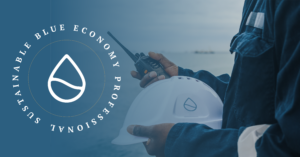
Meet Hari Pemmaraju, one of our success stories from ECO Canada’s Immigrant Bridging Program. This training program, which we are currently piloting, provides newcomers to Canada with an opportunity to gain meaningful employment through wage funding and professional development resources.
Hari was successfully placed as a Technical Consultant at The Delphi Group. He is a specialist in the calculation and qualification of greenhouse gases and other emissions for Delphi’s clients. He has a Master’s degree in Environment and Sustainable Technology, a Bachelor’s degree in Mechanical Engineering and is a certified Indo-Pacific Eco Diver.
We had the pleasure of interviewing him on his experiences with relocating to Canada, our Environmental Immigrant Bridging Program and his career in the environmental sector.
Hi Hari, thank you for speaking with us today. Can you tell us some more information about your background? When did you decide to move to Canada?
I moved to Canada in September 2017. Prior to that, I worked in the Middle East, primarily between Oman and Dubai. I was working as an Environmental Consultant for about 5 1/2 years. During this time, I was executing and managing EHS, impact/risk assessments, and sustainability assignments. My work encompassed a wide array of industries: oil and gas upstream, downstream, mixed-use developments, master planning, infrastructure projects, power and desalination.
I was looking for a more challenging role and wanted to work in a country at the forefront of climate action. Canada was one of my top choices. A lot of thought went into where I should move and ultimately Canada was the best fit. I then relocated as a permanent resident.
What motivated you to pursue a career in the environmental sector?
I wanted to get involved with anything that had to do with saving the planet. Having a background in mechanical engineering, I think it was a natural next step to understand material systems. That’s why I chose Chemical Engineering at a Master’s level. From there I was able to get involved in different pursuits, such as getting my marine diver certification to carry out coral reef assessments.
This had nothing to do with engineering, but I wanted to understand and see first-hand the impact of high-concentrate brine on coral reefs for a report I was writing. I think if you have a strong passion, the rest comes naturally.
I liked how the sector had many diverse fields coming together: ecologists, engineers, policymakers. You have all of these facets coming together and I think your path evolves based on the type of role you get into.
How did you become involved in the Environmental Immigrant Bridging Program?
I was aware of ECO Canada and its programs years before moving to Canada, mostly from LinkedIn. After arriving in Calgary, I went to a few networking events, connected with environmental professionals, and was then referred by a friend to the Immigrant Bridging Program. That’s how I ended up applying.
What were some of the key benefits you enjoyed through the program?
I think the biggest differentiator was the support network provided; it gave me a real confidence boost. I had gone through about six months of active job hunting when I applied for the program and it gave me the positivity that I was lacking at the time. I was starting to feel a bit bummed out about not breaking into the sector, but this program changed things. One of the coordinators at ECO Canada also put together a LinkedIn group to connect people in the program so you know you’re not the only one fighting this challenge. I got a couple of interviews after that.
Other helpful resources were the courses within the “Environmental Immigrant Online Training Program.” I think it’s important to get the cultural context when you are used to working in another part of the world, which these courses helped me to gain. Specifically, the “Essential Skills for Job Seekers” course helped in my job search, the “Overview of the Canadian Environmental Sector” gave me a new perspective on the industry in Canada and the “Professional Communications” course helped further develop my communication skills allowing me to successfully understand Canadian work culture.
Would you recommend this program to other newcomers to Canada who are looking to build a career in the environmental sector?
I would definitely recommend the program; it’s a bit of a no-brainer. ECO Canada has a very large network and all the professors and students know about it. Research and Industry folks are all Environmental Professional (EP) certified members. So yes, I think it’s a great place to make connections. I am still in touch with everyone I met in Calgary in 2017, and affiliation with ECO Canada and a professional network helps verify your credibility before you go in for an interview.
That’s great! So, you have successfully secured work as a technical consultant at The Delphi Group. Can you provide our readers some insights on what it is like to work in the Canadian environmental sector?
One thing I’ve enjoyed about working in Canada is the great work-life balance. You go 100% all-out between 8-4 or however long, and you don’t get the odd email from your boss over the weekend. Also, innovation is highly valued, with a strong emphasis on training and development.
What’s your favorite part of your current job?
I’d say it’s figuring out solutions. I think with any sustainability consultant, you’re trying to tackle problems that were not identified before or were never even there before. When you have limited data and a finite amount of time and budget, coming up with solutions gives a real intellectual high. I think what happens with sustainability professionals is that a lot of technical work goes on, but there’s also a storytelling component. Finding a way to communicate complex technical jargon in order to influence change in a positive way, I think that’s what I like best.
In your opinion, what are some of the biggest challenges facing newcomers to Canada who are trying to find employment in the environmental sector?
One of the major challenges I faced was unknowingly arriving during the wrong time of year. I arrived in late summer not realizing that peak recruitment for jobs in my field is in the spring. I would advise newcomers to try and time their arrival for winter (January or February) so that you’re ready for the spring/summer recruitment season. That’s one thing I would change if I had an option to go back.
The second thing is, before you move to Canada, you should put in 6-9 months of time researching your industry and making connections with recruiters and prospective employers. You need to have connections with people active in the industry, people looking for jobs, students, retired folks. Having a wide spectrum of connections 6-9 months before moving to Canada gives you a head start. I was able to connect with someone in Canada through a blog that I found on the ECO Canada website who was able to provide me with some great advice on the sector before I even arrived.
What advice would you give to newcomers to Canada who are seeking work in the environmental field?
Meet with a recruitment advisor for a skills assessment or self-evaluation and be honest with yourself. What portion of these skills can be transferred to the Canadian workforce? Keep in mind that not all skills and experience are transferable. Do you need language training, or do you need to further your education? When settling in a new country, be ready to start from scratch and build from there.
I found great value in Permanent Resident settlement services; they will tell you about banking, healthcare, renting a place, and give you feedback on your resume.
That’s some great advice. Where do you see yourself in 5 years?
I’d like to be where the action is. There’s a lot of action in Calgary with the oil and gas sector, and how they’re trying to strike a balance between investors and climate change and sustainability priorities. In 5-10 years I would like to grow into a global leader because I want to take the skills, technology and approach to sustainability that I learned here and implement these back in places where it is needed the most. Mostly my goal is to learn and grow into a leadership role that can influence change.
We have one last question for you: In your opinion, what are some of the biggest threats the environment is facing today, and how do we overcome the challenges that these threats pose?
I think a lot of it has to do with climate leadership at large. Signs of climate change are there, it’s well published, it’s on thousands of web pages. The challenge is communicating it in the right way. I think that’s the biggest gap- the science is there, the technology is there. It’s about mobilizing the finance and also the intent from the market as well as the public in terms of how we combat climate change.
At the same time, you have to balance the existing industry, like what we’re facing in Alberta- do we move away from oil fields completely? This is a legacy industry that we have. There is a challenge of generating enough revenue while still reducing our carbon footprint. For me, it’s all about leadership and getting priorities right.
Managing fake news is also a problem- there’s a lot of information out there which confuses people on the connection between a cold winter and global warming. That’s where I think communication with the right sort of climate leadership can solve a lot of the problems we have.
Thank you again, Hari, for participating in our interview. Your passion and enthusiasm really shine through in the way you speak about the environment and your new role. You are definitely on your way to becoming a leader in the sector! We look forward to the upcoming webinar and hearing more of your insights.
Interested in learning more about Hari’s job search and his tips for finding a job in the Canadian environmental sector? Attend our free webinar on May 1, 2019. Register here.
The Environmental Immigrant Bridging Program project is funded in part by the Government of Canada’s Foreign Credential Recognition Program.
 [
[




